Over dinner with Eibhlín, Alan and their children, in what Alan refers to as the “tent” at Mount Falcon estate, the couple continuously talk about local people – the engineer in Ballina who built the barbecue and the waiter who set up his Alpaca farm are just two examples. 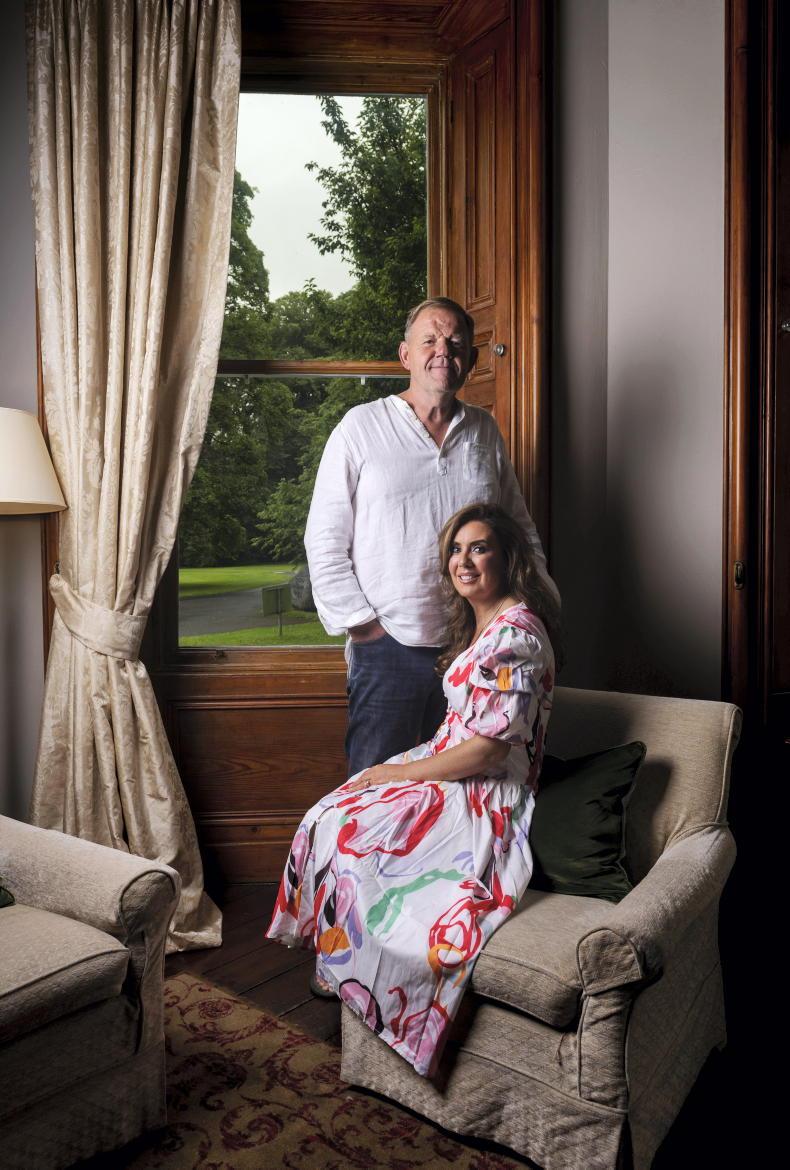
COVID-19 has brought many changes to the couple’s business and they had to adapt to survive. This adaptation saw Eibhlín becoming more involved and marketing their facilities to a new audience.
Recognisable for her TV work covering news and current affairs on TG4, RTÉ, Virgin Media, Sky and Raidió na Gaeltachta, it is her partner Alan – who bought Mount Falcon in 2002 with his brothers – whose story might be less familiar.
Jerusalem to Kiltimagh
“I’m the second youngest of four boys,” he says. “[We were] born in Jerusalem but my father’s family originated in Kiltimagh in Co Mayo.”
Alan’s father John was a garda, but in 1952 his role was “primarily in kicking tenants out of tenancies,” which he hated. When offered an opportunity to be seconded to the United Nations (UN) in 1956, he took it.
“[He] was only supposed to be gone for six months, but he was offered a role in a civilian capacity,” Alan explains. “He and his friend, Jim Connolly, were the only two brave enough to give up a secure job in the gardaí during that difficult economic period in [1950s] Ireland. Best decision they ever made. He progressed in his career, which culminated in becoming the chief procurement officer for the UN in the Middle East.”
Connection to Mayo
The family returned to Mayo every second summer, with Alan spending his youth working on his uncle’s farm in Kiltimagh. After 42 years in the UN, John retired home to farm in Mayo until his passing in 2016.
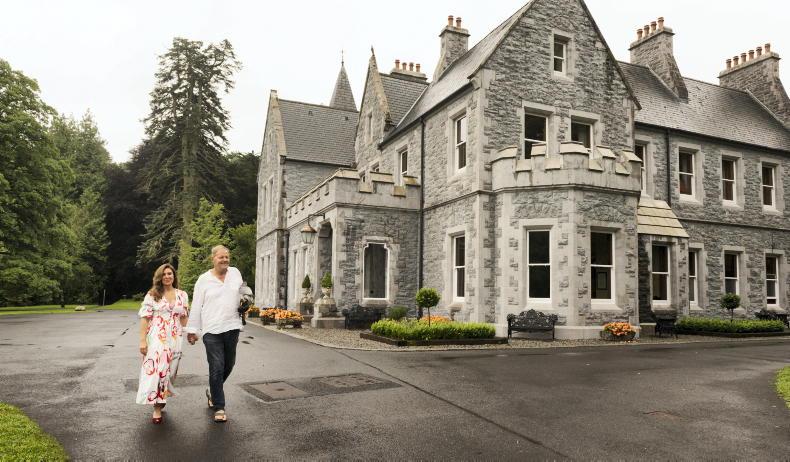
Alan credits his parents with giving him the best education in life – first through travel. Divulging just how adventurous they were, he recalls: “It was an entitlement of the UN to fly home those summers to Ireland, but we rarely flew. My parents bought a second-hand Volkswagen camper – one of those ones that the roof popped up – and we travelled by road. You couldn’t do it anymore, but we did 16 trips from Kiltimagh to the Middle East and two trips to Pakistan and India, all in this camper.”
For the four Maloney boys, this education was completed in Newbridge College in Co Kildare and UCD before their careers took them all over the world.
Although Alan forged his career in finance, his ambition was to establish a business in Mayo to be close to this parents. He tells us that ambition was achieved when he purchased, with the support of his best friends – his brothers – Mount Falcon in 2002. Then he had “the luck of meeting the lovely Eibhlín.”
She fills in the gaps, saying that this meeting was at the “cattle mart” that is the Radisson on Galway race week – but that story is for a different article.
Why Mount Falcon?
Mount Falcon was already sold when Alan saw it and it took him 18 months to buy it from the initial purchaser. But, to Alan, this was “the right property in the right location” and, most importantly, he says: “I could see the development, without taking away from the classic parkland. Too many places are overdeveloped.”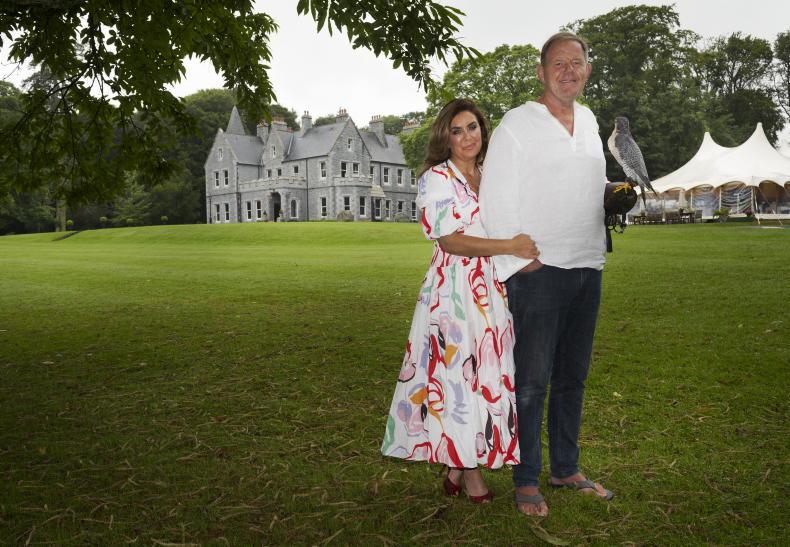
“We went through all the planning, jumped through every hoop and did everything right – unlike everybody else in the country [who were] just throwing it up at that time. We put up the crane on 5 April 2005 and we hosted three weddings in a row, three weekends in a row from 7 June 2006 – I’ll never forget it.
“I was that naive I thought that was the bulk of the work done [at that stage],” he adds. “Yeah, and it’s challenged me ever since, but I love it.”
The model is a tried and tested one. The original house was extended, but the bulk of the accommodation is provided by 45 lodges. The lodges were key to the project in two ways: they financed the project while also supplementing the accommodation capacity.
“We have only 32 bedrooms in the hotel but it is actually a 156-bedroom facility with all of the capacity of the lodges,” Alan says.
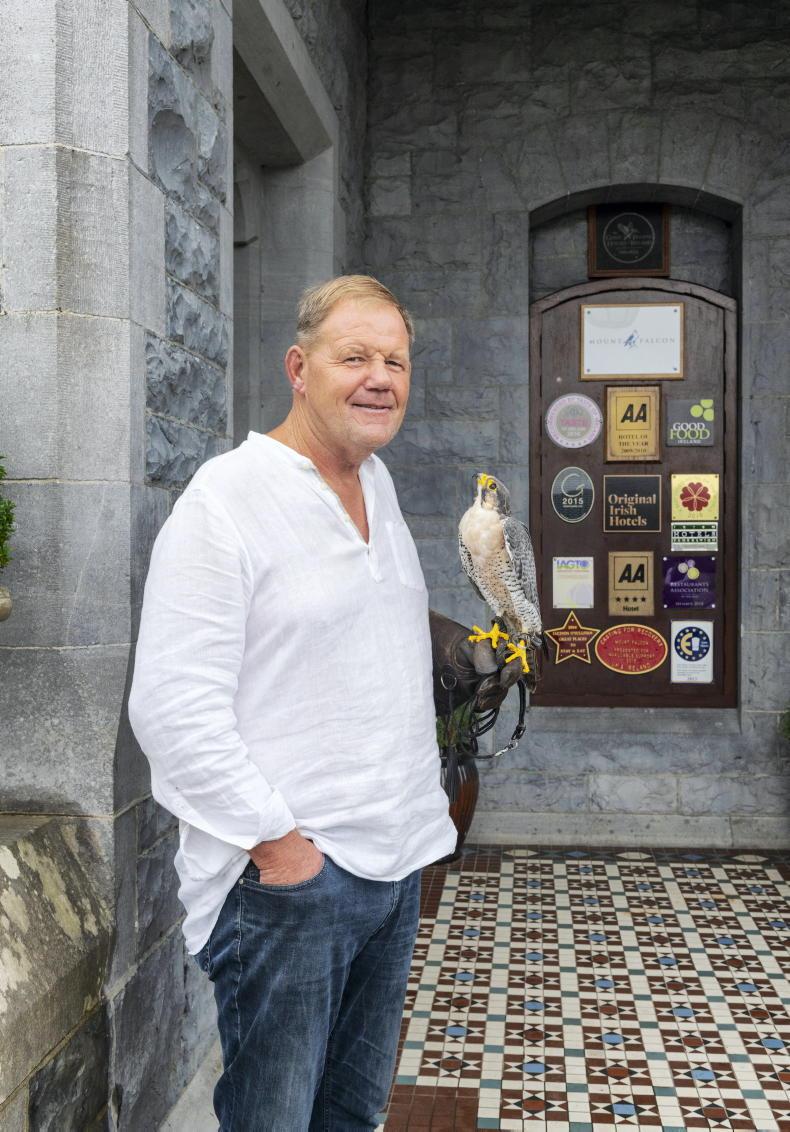
Mount Falcon was already sold
when Alan saw it and it took him 18 months to buy it from the initial purchaser. \ Michael McLaughlin
All has changed?
So what does one do with a vast 100ac estate and 156 bedrooms when a pandemic completely shuts down the hospitality sector?
You adapt, as “there is nothing else you can do,” Eibhlín says.
“What has changed? Everything. Everything has changed,” Alan exclaims. “The nooks and crannies of the original house, our bar, our wonderful fine dining restaurant and our spa became redundant overnight because of the spatial distancing.”
During the spring of the first lockdown, with the weather good, Alan, Eibhlín, their kids and the ten staff (of 104) who were not furloughed were out painting the lodges.
The exasperation of the time was plain: “When all the bookings evaporated within two weeks, I kept thinking – what the hell am I going to do with my business?”
An idea was hatched from Alan’s youth in the Middle East.
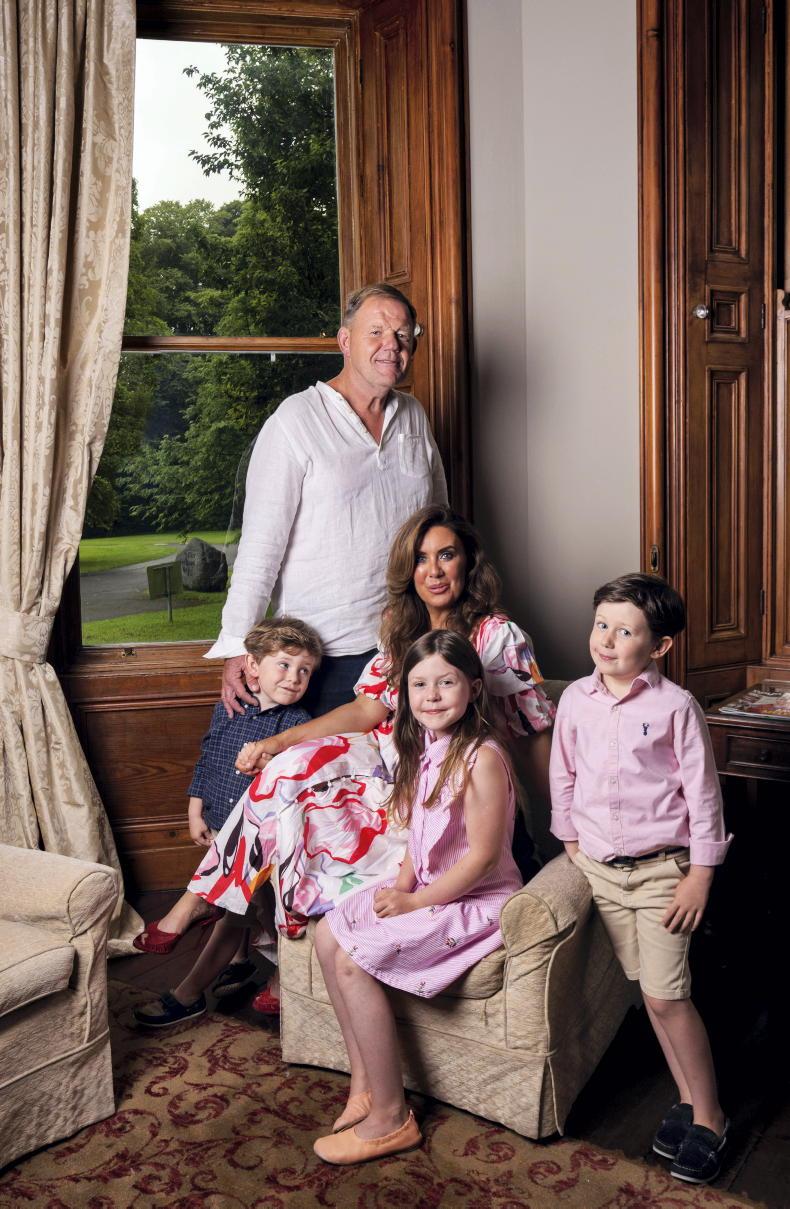
Alan and Eibhlín with their children, from left, Sean, Ally and Finn. \ Michael McLaughlin
“I’d seen a lot of these military canvas tents in Israel – like those in MASH (an American TV series) – so I got this idea I was going to get one of those. I was born and reared on a barbecue so I thought we set up a barbecue, an outdoor bar and then put on some concerts. I set to work on it. I was even contacting friends of mine in Israel to see, logistically, if I could get one of those big military tents. I couldn’t, so instead I saw the tent at Bloom and traced it back to John Fahy from Eventus in Tuam. I leased it from him and it kind of took off from there.”
People adapt
That was the start for the business again, Alan says. “That was it. We are outdoors in an Irish summer, underneath a tent. Tom Doyle, our head chef, was in L’Ecrivain – a Michelin star restaurant – he is of that standard and his fine dining experience now is that I have him cooking in front of a barbecue. But all the staff played their part.”
Alan drew out the design for the barbecue and tried to import one, but that was impossible. Then, one of his colleagues told him about a steel fabricator in Ballina who is “a genius”.
“I met this guy, he built it to my specification and he did it in four weeks. Talk about people being creative, innovative and being able to leverage local competencies. That’s the whole key to it. Last Sunday we fed 562 people. I couldn’t do that without that barbecue.”
With three young children, Eibhlín wanted to transform Mount Falcon into a family-friendly environment. Through roads are closed and children can play without worry. The challenge now is what is next for Mount Falcon?
The couple see COVID-19 as an opportunity to change the direction of their business.
Planning problems
Alan explains the issue they face: “The current structure is a stretch tent, only certified during the summer. I started to work on a permanent structure which would be an events venue. My plan was to have it up for this year. But I couldn’t get Mayo County Council to approve it.”
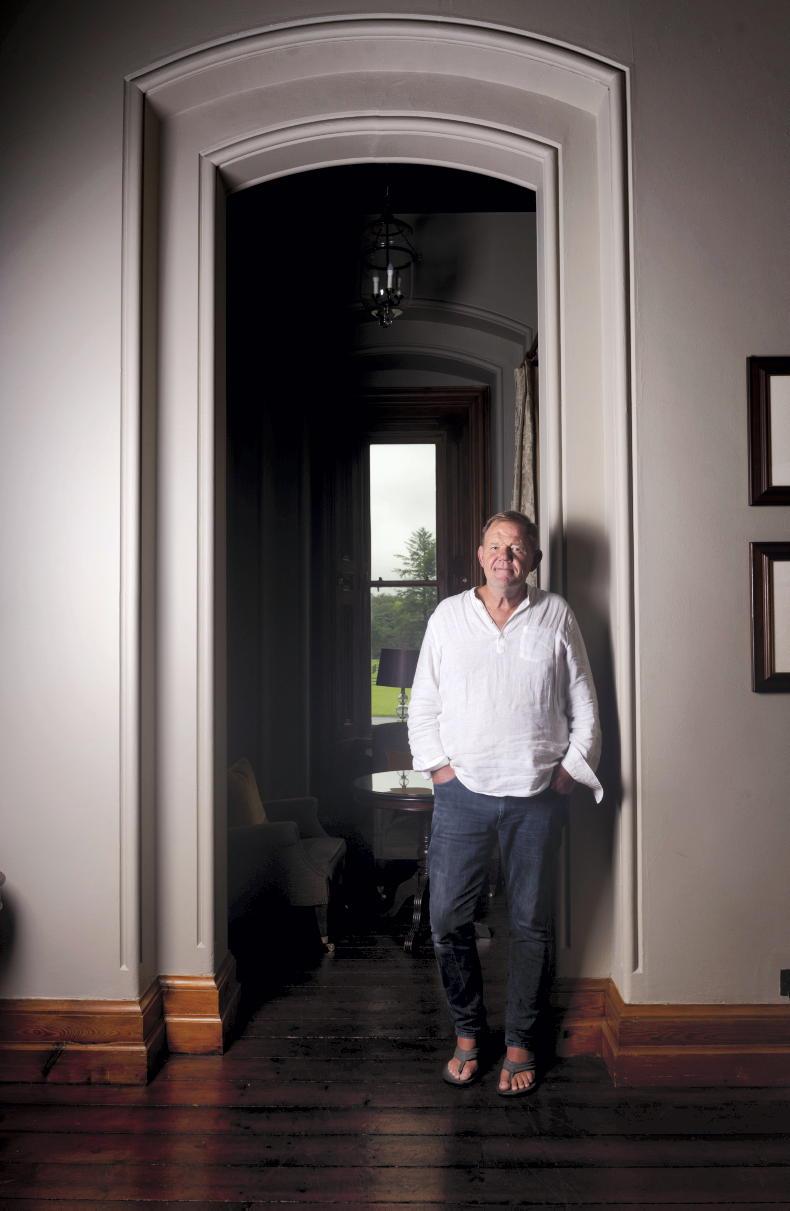
The structure Alan sourced was insulated by a German company – a fact Alan found ironic as Mayo County Council turned the permission down on the basis of the energy rating.
“They expected it to have the same BER rating as a blocks and mortar structure. The roof system on the proposed structure is effectively an air cushion, a vacuum which provides the insulating capacity, but air has to breathe through it – it can’t have the same BER, it’s impossible.”
With planning refused, the backup plan of re-erecting the tent from the previous year was put in place and Alan (at the time of writing) was meeting again with Mayo County Council to progress the “Pavaillion” for 2022.
Giving back during COVID
Alan is grateful for Government supports, without which, he says, they would not have survived. When COVID-19 set in and the family were busy painting, he contacted the HSE to offer them the use of his empty lodges for frontline workers who were working in the hospitals and nursing homes in the area and needed to isolate.
The HSE did avail of this but continuously asked him for rates – to which he repeated: “I’m not proposing to charge you. The Government are furloughing our staff. You can use the facility, it’s sitting here doing nothing.”
That, he says, had huge traction, locally.
We thought of the young kids living in the local towns, cooped up, and all this park land with nobody using it
Alan and Eibhlín are conscious of how privileged they are to raise their young kids where they do and were conscious of children who don’t have that amount of space in which to explore.
“When COVID hit last year, we put ads on Midwest Radio and in the Western People to invite families to come here,” Alan says. “We thought of the young kids living in the local towns, cooped up, and all this park land with nobody using it.”
“We put out tables and people were coming in just walking around, walking the dogs, getting their picnics. Those two initiatives garnered an awful lot of support.”
Read more
‘Tourism has to work for the locals first’
A different spin on life
Over dinner with Eibhlín, Alan and their children, in what Alan refers to as the “tent” at Mount Falcon estate, the couple continuously talk about local people – the engineer in Ballina who built the barbecue and the waiter who set up his Alpaca farm are just two examples. 
COVID-19 has brought many changes to the couple’s business and they had to adapt to survive. This adaptation saw Eibhlín becoming more involved and marketing their facilities to a new audience.
Recognisable for her TV work covering news and current affairs on TG4, RTÉ, Virgin Media, Sky and Raidió na Gaeltachta, it is her partner Alan – who bought Mount Falcon in 2002 with his brothers – whose story might be less familiar.
Jerusalem to Kiltimagh
“I’m the second youngest of four boys,” he says. “[We were] born in Jerusalem but my father’s family originated in Kiltimagh in Co Mayo.”
Alan’s father John was a garda, but in 1952 his role was “primarily in kicking tenants out of tenancies,” which he hated. When offered an opportunity to be seconded to the United Nations (UN) in 1956, he took it.
“[He] was only supposed to be gone for six months, but he was offered a role in a civilian capacity,” Alan explains. “He and his friend, Jim Connolly, were the only two brave enough to give up a secure job in the gardaí during that difficult economic period in [1950s] Ireland. Best decision they ever made. He progressed in his career, which culminated in becoming the chief procurement officer for the UN in the Middle East.”
Connection to Mayo
The family returned to Mayo every second summer, with Alan spending his youth working on his uncle’s farm in Kiltimagh. After 42 years in the UN, John retired home to farm in Mayo until his passing in 2016.

Alan credits his parents with giving him the best education in life – first through travel. Divulging just how adventurous they were, he recalls: “It was an entitlement of the UN to fly home those summers to Ireland, but we rarely flew. My parents bought a second-hand Volkswagen camper – one of those ones that the roof popped up – and we travelled by road. You couldn’t do it anymore, but we did 16 trips from Kiltimagh to the Middle East and two trips to Pakistan and India, all in this camper.”
For the four Maloney boys, this education was completed in Newbridge College in Co Kildare and UCD before their careers took them all over the world.
Although Alan forged his career in finance, his ambition was to establish a business in Mayo to be close to this parents. He tells us that ambition was achieved when he purchased, with the support of his best friends – his brothers – Mount Falcon in 2002. Then he had “the luck of meeting the lovely Eibhlín.”
She fills in the gaps, saying that this meeting was at the “cattle mart” that is the Radisson on Galway race week – but that story is for a different article.
Why Mount Falcon?
Mount Falcon was already sold when Alan saw it and it took him 18 months to buy it from the initial purchaser. But, to Alan, this was “the right property in the right location” and, most importantly, he says: “I could see the development, without taking away from the classic parkland. Too many places are overdeveloped.”
“We went through all the planning, jumped through every hoop and did everything right – unlike everybody else in the country [who were] just throwing it up at that time. We put up the crane on 5 April 2005 and we hosted three weddings in a row, three weekends in a row from 7 June 2006 – I’ll never forget it.
“I was that naive I thought that was the bulk of the work done [at that stage],” he adds. “Yeah, and it’s challenged me ever since, but I love it.”
The model is a tried and tested one. The original house was extended, but the bulk of the accommodation is provided by 45 lodges. The lodges were key to the project in two ways: they financed the project while also supplementing the accommodation capacity.
“We have only 32 bedrooms in the hotel but it is actually a 156-bedroom facility with all of the capacity of the lodges,” Alan says.

Mount Falcon was already sold
when Alan saw it and it took him 18 months to buy it from the initial purchaser. \ Michael McLaughlin
All has changed?
So what does one do with a vast 100ac estate and 156 bedrooms when a pandemic completely shuts down the hospitality sector?
You adapt, as “there is nothing else you can do,” Eibhlín says.
“What has changed? Everything. Everything has changed,” Alan exclaims. “The nooks and crannies of the original house, our bar, our wonderful fine dining restaurant and our spa became redundant overnight because of the spatial distancing.”
During the spring of the first lockdown, with the weather good, Alan, Eibhlín, their kids and the ten staff (of 104) who were not furloughed were out painting the lodges.
The exasperation of the time was plain: “When all the bookings evaporated within two weeks, I kept thinking – what the hell am I going to do with my business?”
An idea was hatched from Alan’s youth in the Middle East.

Alan and Eibhlín with their children, from left, Sean, Ally and Finn. \ Michael McLaughlin
“I’d seen a lot of these military canvas tents in Israel – like those in MASH (an American TV series) – so I got this idea I was going to get one of those. I was born and reared on a barbecue so I thought we set up a barbecue, an outdoor bar and then put on some concerts. I set to work on it. I was even contacting friends of mine in Israel to see, logistically, if I could get one of those big military tents. I couldn’t, so instead I saw the tent at Bloom and traced it back to John Fahy from Eventus in Tuam. I leased it from him and it kind of took off from there.”
People adapt
That was the start for the business again, Alan says. “That was it. We are outdoors in an Irish summer, underneath a tent. Tom Doyle, our head chef, was in L’Ecrivain – a Michelin star restaurant – he is of that standard and his fine dining experience now is that I have him cooking in front of a barbecue. But all the staff played their part.”
Alan drew out the design for the barbecue and tried to import one, but that was impossible. Then, one of his colleagues told him about a steel fabricator in Ballina who is “a genius”.
“I met this guy, he built it to my specification and he did it in four weeks. Talk about people being creative, innovative and being able to leverage local competencies. That’s the whole key to it. Last Sunday we fed 562 people. I couldn’t do that without that barbecue.”
With three young children, Eibhlín wanted to transform Mount Falcon into a family-friendly environment. Through roads are closed and children can play without worry. The challenge now is what is next for Mount Falcon?
The couple see COVID-19 as an opportunity to change the direction of their business.
Planning problems
Alan explains the issue they face: “The current structure is a stretch tent, only certified during the summer. I started to work on a permanent structure which would be an events venue. My plan was to have it up for this year. But I couldn’t get Mayo County Council to approve it.”

The structure Alan sourced was insulated by a German company – a fact Alan found ironic as Mayo County Council turned the permission down on the basis of the energy rating.
“They expected it to have the same BER rating as a blocks and mortar structure. The roof system on the proposed structure is effectively an air cushion, a vacuum which provides the insulating capacity, but air has to breathe through it – it can’t have the same BER, it’s impossible.”
With planning refused, the backup plan of re-erecting the tent from the previous year was put in place and Alan (at the time of writing) was meeting again with Mayo County Council to progress the “Pavaillion” for 2022.
Giving back during COVID
Alan is grateful for Government supports, without which, he says, they would not have survived. When COVID-19 set in and the family were busy painting, he contacted the HSE to offer them the use of his empty lodges for frontline workers who were working in the hospitals and nursing homes in the area and needed to isolate.
The HSE did avail of this but continuously asked him for rates – to which he repeated: “I’m not proposing to charge you. The Government are furloughing our staff. You can use the facility, it’s sitting here doing nothing.”
That, he says, had huge traction, locally.
We thought of the young kids living in the local towns, cooped up, and all this park land with nobody using it
Alan and Eibhlín are conscious of how privileged they are to raise their young kids where they do and were conscious of children who don’t have that amount of space in which to explore.
“When COVID hit last year, we put ads on Midwest Radio and in the Western People to invite families to come here,” Alan says. “We thought of the young kids living in the local towns, cooped up, and all this park land with nobody using it.”
“We put out tables and people were coming in just walking around, walking the dogs, getting their picnics. Those two initiatives garnered an awful lot of support.”
Read more
‘Tourism has to work for the locals first’
A different spin on life












 This is a subscriber-only article
This is a subscriber-only article










SHARING OPTIONS: